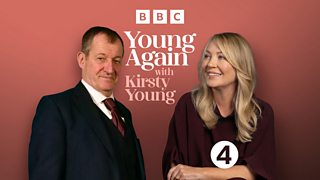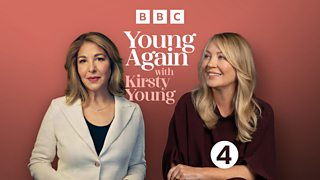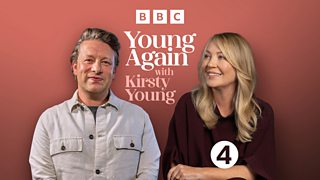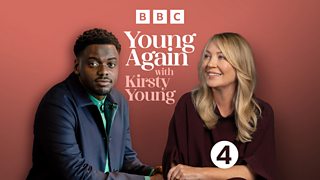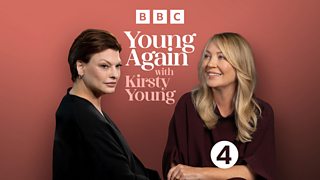Alastair Campbell: Eight things we learned when he spoke to Kirsty Young
In her 大象传媒 Radio 4 podcast, Young Again, journalist and broadcaster Kirsty Young takes her guests back to meet their younger selves and asks the question: if you knew then what you know now, what would you have done differently?
Alastair Campbell is best known for his political work alongside Labour leader Tony Blair in various roles including Downing Street Press Secretary and spokesman for the Labour Party. Nowadays he is a journalist, author and broadcaster, drawing the attention of new audiences as the co-presenter of the podcast The Rest is Politics.
Here are the things we learned when he met Kirsty Young...
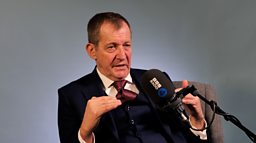
1. Tribalism has played a large part in his life
Early on in their conversation Kirsty makes an observation, based on his life-long love of Burnley Football Club and close association with the Labour Party, that she puts to Alastair:
You have to have enemies sometimes because you're arguing about big, difficult things: Leave/Remain; Labour/Tory.Alastair on the political landscape
“You seem attached to identities like that. What do you like about tribalism?”
“Basically, I don't know if I do like [tribalism],” replies Alastair, “but I think certainly in sports, I've got it very, very strongly – but I don't define it by hate. A lot of Burnley fans define their support for Burnley by hating Blackburn Rovers, right? I don't hate them, but I think if I'm doing something, I like to be absolutely committed to doing it.”
“I guess that means that, particularly in the political landscape, you have to have enemies sometimes because you're arguing about big, difficult things: Leave/Remain; Labour/Tory.”
“Within the Labour Party I got kicked out because I was probably seen as being a bit too tribal on the People's Vote [the group that campaigned for a second post-Brexit referendum] side of things, so I don't think tribalism is necessarily a good thing.”
“I feel tribally Labour, despite having been expelled from the tribe because it's about something in me. That is, I identify with the Labour Party very, very strongly.”
2. His brother’s mental health diagnosis had a huge impact on Alastair
Alastair is the third of three brothers, and he also has a younger sister. He sees a major defining factor of his youth was “when my elder brother Donald was diagnosed with schizophrenia. When I was in my late teens, he was early 20s and that was a massive, massive moment for the whole family. And he's the real reason I campaigned on mental health and stuff because I saw what it did to him. I saw what it did to the rest of his life.”
“He died 20 years younger than my dad - that's the kind of average for people who are on antipsychotic drugs for a long, long time. But that was a big, big, big thing. And I wasn't a child, I also was 17 or 18 by then.”
“But that was massive for the family, absolutely massive.”
Alastair recalls seeing his brother after his first psychotic episode: "The first time it was horrific. He was in the bed. He'd been drawing all these things on the wall. Crosses and Jesus and all this sort of stuff that often goes on in psychosis. And he was like a different person. His eyes were different. He was scared. It defined obviously the rest of his life. But for us it was quite defining as well.”
Alastair has been a longtime supporter and advocate for charities working to break down the stigma surrounding mental health and is an honorary fellow of the Royal College of Psychiatrists in recognition of his work in this area.
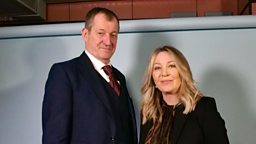
3. He thinks his reputation as Tony Blair’s rottweiler is overblown
“I think I felt I had to project strength,” says Alastair, “because in the job I was doing with the Labour Party and Tony Blair, I had seen what the media did to Neil Kinnock, had seen what the Tories did to Neil Kinnock, and I was absolutely determined that that was not going to happen to us.”
If I look at what's happening in the government today, the kind of the manipulation that goes on is beyond anything we did.
Alastair’s first role was as Blair's spokesman and campaign director in opposition. Following Labour’s election win in 1997 he then became Downing Street Press Secretary.
"I don't think I was as competitive as people make out by the way... But I accept that a part of the way that I operated was to kind of stand up for myself and stand up for what I believe in.”
"If I look at what's happening in the government today, the kind of the manipulation that goes on is beyond anything we did. And yet nobody bats an eyelid. My point is I was robust. Yes, I stood up against people and got that reputation, but I think the reputation was overdone.”
4. He was sacked by media tycoon Robert Maxwell – more than once
Before his political career, Alastair was a journalist, working his way up to be Political Editor at the Mirror Group, which was owned at the time by Robert Maxwell.
“I've read that you were very close to Robert Maxwell. Is that a fair characterisation?” asks Kirsty.
"I don't think it is. I was close in that I was the political editor and he owned the paper for part of that time, and he was very interested in the politics,” says Alastair.
“I'd say how I would define it is that with the help of some pretty good editors I managed to keep him at bay most of the time.”
“He sacked me a few times because he was one of those guys, incredibly overbearing. And if he told you something – I remember once he told me this story, which I just knew was complete bollocks but he wanted it in the paper. We didn't write it; we didn't run it. And so the next time I saw him, he said, ‘Look, you're finished here. Never darken my door again.’”
“And I remember, I think it was Roy Greenslade who was editor at the time, he went, ‘Just ignore it. Just turn up tomorrow, he’ll forget.’ Because he did forget.”
Robert Maxwell died in 1991 when his body was found floating in the Atlantic Ocean having apparently fallen off his yacht. This led to the collapse of his companies and it was revealed shortly afterwards that he had been fraudulently taking money from his own companies’ pension funds.
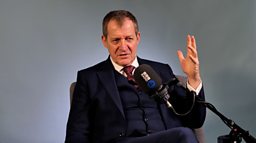
5. He’s had a problematic relationship with alcohol in the past
“I stopped drinking in 1986,” explains Alastair. “I didn't drink again until 1999. And then I sort of fell off the wagon, but I didn't drink a lot. And then I've drunk intermittently since then. At the moment, I'm not drinking at all,” says Alastair in reply to Kirsty’s questions about the reputation of journalism and politics as being hard-drinking cultures.
I will lie on my deathbed wishing I'd done more to change the world.
“Put it this way. The 1980s is the last time I was smashed out my brain.”
What advice would he give his younger self about alcohol?
“I think it would be not to drink. I think I developed a problematic relationship with alcohol quite young, like before I was 18.”
“I said at one point I was allergic to eggs, which I now looking back realise that the symptoms I was displaying were probably alcohol poisoning. But I convinced myself and the doctor that actually it was because I'd eaten some eggs.”
“Whenever I was travelling with Tony Blair, if he was being served eggs in a British embassy or a state dinner or something, I would be getting something else because it was written down I was allergic to eggs. I wasn't allergic to eggs. I'm not allergic to eggs.”
6. He’s been with his partner for 42 years
Following university and time busking in Europe playing the bagpipes Alastair applied to The Mirror newspaper’s training scheme for journalists.
“When I left university, I didn't have a clue what I was going to do. I bummed around for quite a while,” says Alastair. “I have no idea how I knew about the existence of the Mirror Group training scheme... There was nobody saying to me you should be a journalist.”
“[My parents] just thought I was kind of working out what I wanted to do. And so I applied to this thing, and it was one of the best training schemes in the country. Thousands of people applied and very few got accepted. I got accepted. Stroke of luck: that's where I met Fiona.”
Fiona and Alastair have been together for 42 years. What does he put that longevity down to?
"Her really,” admits Alastair before adding, “We're both very, very strong characters. It's interesting during COVID, I mean, how many people do you know during COVID who thought, ‘Bloody hell, I'm not sure this marriage is going to work out?’”
“Whereas the best thing about COVID was realising that if there was one person in the world that I can stomach being with 24 hours a day, it's probably Fiona. So that was a wonderful sort of revelation.”
“We had a lot of ups and downs and I'm a very difficult person to live with, I think and at times. She is amazing at dealing with my ups and downs and my moods, and she's very, very strong.”
7. What has he learnt from dealing with his depression?
Alastair has long suffered with bouts of depression that he has publicly acknowledged and is a longtime supporter of better mental health awareness.
But it took a long time for him to face up to personal experiences and he successfully hid it for many years through his career until things reached breaking point:
“I think it was 2005, maybe earlier than that. Fiona and I were out for a walk one day and I started punching myself in the face really hard. Even as I was doing it – she was terrified – I can remember having the conscious thought, ‘You've gotta get help.’”
“There are certain things that you just can't do on your own,” he realises now and says is the thing he has learnt. “You have to have help and if you get the right person, which I was lucky to do, if you get the right person for you – and it's hard – stick with it and trust them.”
8. He feels a guilt about Brexit but knows he shouldn’t
“I think I will lie on my deathbed,” says Alastair towards the end of his conversation, ”not wishing I'd spent more time at the office, but I will lie on my deathbed wishing I'd done more to change the world. I’ve got no doubt about that.”
Alastair is now one half – along with Rory Stewart – of the successful podcast, The Rest is Politics. But he feels at times that it’s not enough, saying: "The other day somebody stopped me in the street: ’I love your podcast.’ ‘Oh, thank you very much,’ but part of me was thinking, ‘Where's this going? I've got a train to catch.’
“And then I said, ‘Yeah, well, it's great, but if you really want to change the world, you've got to get involved properly in politics, you've got to start a charity or whatever it might be, and this woman said: ‘Oh, don't underestimate how many people you're touching, you might be inspiring, you might be motivating.’”
“I walked away and I'd love to be able to say that made me feel good. It didn't. It made me feel guilty. I walked away thinking, ‘if she thinks I can have that effect on people through doing a podcast or writing a book about activism, how much more could you do if you actually did it properly?”
“I've got to tell you, I can lie awake in bed tonight absolutely convincing myself that I was responsible for Brexit by not getting involved in the first campaign. And because of Brexit, Donald Trump became President. And because Donald Trump became President...” says Alastair imagining a whole chain of cause and effect.
“And I know it's insane because when I've stopped the loop I can realise that, well, you didn't, so there's no point in thinking about it.”

